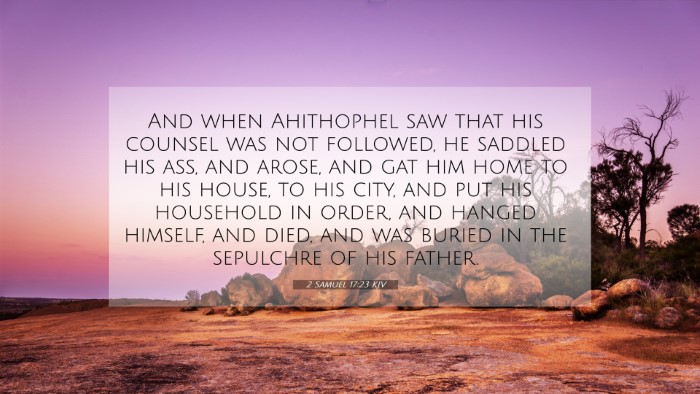Understanding 2 Samuel 17:23
Verse Reference: 2 Samuel 17:23 (KJV)
"And when Ahithophel saw that his counsel was not followed, he saddled his ass, and arose, and got him home to his house, to his city, and put his household in order, and hanged himself, and died; and was buried in the sepulchre of his father."
Summary of the Verse
This verse reflects a pivotal moment in the life of Ahithophel, who was a trusted advisor to Absalom during his rebellion against King David. The moment his counsel was disregarded leads to his despair and ultimately, his tragic decision to take his own life. This passage gives deep insights into the consequences of pride, disillusionment, and the importance of seeking God's guidance rather than relying solely on human wisdom.
Commentary Insights
Various commentaries provide different perspectives and insights regarding this verse. Here's a summary of thoughts from Matthew Henry, Albert Barnes, and Adam Clarke:
- Matthew Henry: Henry emphasizes the depth of Ahithophel’s disappointment when his advice is rejected. He interprets Ahithophel’s suicide as a manifestation of the despair that accompanies a prideful heart when stripped of power and influence. Henry also suggests that his end serves as a warning against the dangers of finding one's purpose and value in worldly success and recognition.
- Albert Barnes: Barnes highlights the strategic implications of Ahithophel's advice regarding Absalom and the response to David. He notes that Ahithophel’s failure to persuade Absalom indicates a failure of leadership, leading Ahithophel to feel that death was a preferable option to living in disgrace. This commentary focuses on the broader theme of betrayal and loyalty within the dynamics of familial and political relationships in the context of biblical history.
- Adam Clarke: Clarke examines the historical and theological aspects surrounding Ahithophel's actions and their consequences. He discusses the cultural context of suicide in ancient times and the weight that such an act carried. Clarke underscores the importance of understanding the despair that can lead to such drastic measures when individuals seek validation in their counsel over reliance on divine wisdom.
Cross-References and Scriptural Connections
2 Samuel 17:23 connects with several important biblical themes and verses. Here are 10 cross-references that further elucidate its themes:
- Proverbs 16:18: "Pride goeth before destruction, and a haughty spirit before a fall." - This verse connects as it illustrates the pride that can cloud judgment and lead to downfall.
- Matthew 27:5: "And he cast down the pieces of silver in the temple, and departed, and went and hanged himself." - Similar to Ahithophel, Judas’ actions following his betrayal highlight despair over wrongful choices.
- 1 Chron. 27:33: "And Ahithophel was the king's counsellor: and Hushai the Archite was the king's companion." - Establishing Ahithophel's significance in the royal court.
- Psalm 55:23: "But thou, O God, shalt bring them down into the pit of destruction: bloody and deceitful men shall not live out half their days; but I will trust in thee." - Reflecting on justice and consequences of deceitfulness.
- Genesis 25:28: "And Isaac loved Esau, because he did eat of his venison: but Rebekah loved Jacob." - This illustrates familial strife seen in both David's family and the actions of subsequent characters.
- Jeremiah 17:5: "Thus saith the Lord; Cursed be the man that trusteth in man, and maketh flesh his arm, and whose heart departeth from the Lord." - Highlighting the danger of relying on human wisdom instead of divine guidance.
- Luke 14:28: "For which of you, intending to build a tower, sitteth not down first, and counteth the cost, whether he have sufficient to finish it?" - This underscores the need for careful consideration of one's plans and counsel.
- John 12:6: "This he said, not that he cared for the poor; but because he was a thief, and had the bag, and bare what was put therein." - Reflecting themes of dishonesty and betrayal found in Ahithophel’s character.
- Proverbs 3:5-6: "Trust in the Lord with all thine heart; and lean not unto thine own understanding." - This verse emphasizes the necessity of trusting in God rather than human logic.
- Matthew 7:24-27: "Therefore whosoever heareth these sayings of mine, and doeth them, I will liken him unto a wise man, which built his house upon a rock." - This emphasizes the foundation of wisdom crucial for both life and spiritual decisions.
Thematic Connections
The themes present in 2 Samuel 17:23, including pride, despair, and the consequences of betrayal, resonate through various scripture passages, providing a rich fabric of inter-Biblical dialogue. This verse serves as a poignant reminder of the complexity of human emotions when faced with rejection and how earthly value can lead to eternal consequences when divorced from divine wisdom.
Conclusion
2 Samuel 17:23 encapsulates a profound moment filled with themes of counsel, rejection, and the tragic outcomes that such circumstances can lead to. The insights derived from public domain commentaries emphasize the importance of humility, reliance on God, and the inherent dangers of pride. By exploring the connections between this verse and others, we deepen our understanding of the Biblical narrative and the lessons that endure through time.













